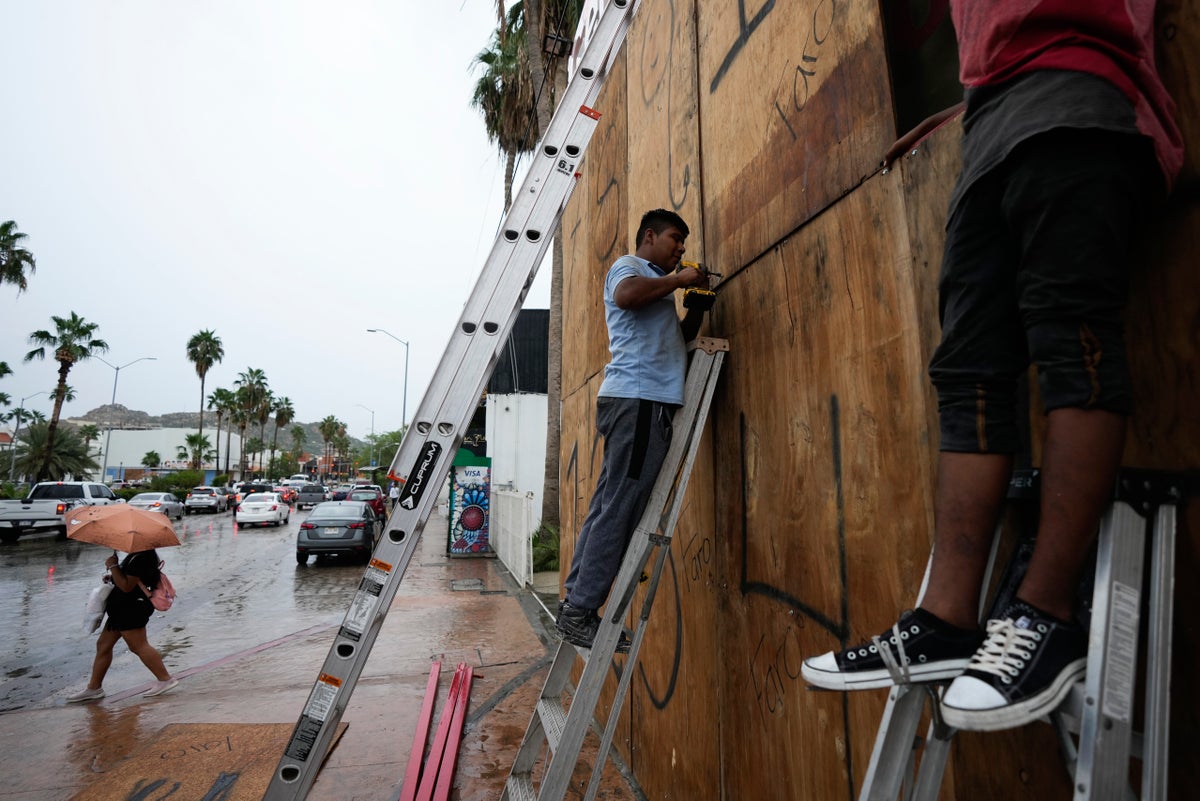
Residents of Mexico’s Los Cabos resorts rushed to prepare as Hurricane Norma headed toward the southern tip of Mexico’s Baja California Peninsula for an expected landfall Saturday, while in the Atlantic, Tammy grew into a hurricane and threatened to batter the islands of the Lesser Antilles.
Businesses in Cabo San Lucas nailed up sheets of plywood over their windows and government personnel hung up banners warning people not to try to cross gullies and stream beds, after Hurricane Norma regained strength and once again became a major storm Friday.
Baja California Sur Gov. Victor Manuel Castro urged people to stay at home.
“Nobody should leave their house after six, seven in the evening," Castro said. "Nobody should go out.”
In the Atlantic, the U.S. National Hurricane Center said Hurricane Tammy had winds of 80 mph (130 kph), and hurricane warnings were issued for the islands of Guadeloupe, Antigua, Barbuda, Montserrat, and St. Kitts and Nevis.
The center said Norma had 120 mph (195 kph) maximum sustained winds and was centered about 145 miles (235 kilometers) south of Cabo San Lucas. The Category 3 storm was moving north-northwest at 9 mph (15 kph), and the center said its outer bands of rain were already reaching the Baja peninsula.
Hotels in Los Cabos, which are largely frequented by foreign tourists, remained about three-quarters full and there was no major move by visitors to leave, Baja California Sur state tourism secretary Maribel Collins said.
With rain already falling in Los Cabos, some flights in and out were canceled Friday, there was no way out anyway. Airports will be closed Saturday, according to the local civil defense office.
The local hotel association estimated there were about 40,000 tourists still in Cabo San Lucas and San Jose del Cabo on Friday.
A couple from San Diego walked through the largely deserted streets of Cabo San Lucas on Friday. Because their sports fishing tournament had been postponed until next week, they had little choice but to stay. The local port was closed to navigation as a precaution.
At the marina in Cabo San Lucas, José Ceseña was hauling out of the water the boat he usually uses to ferry tourists around on tours. With the port closed and a hurricane coming, he said it wasn’t worth risking his craft.
Homero Blanco, the state commander of the National Guard, said beaches at the resort had been ordered closed and Guard troops were sent to clear people from the seashore.
“This morning there were a few people on the beach when we cleared it,” Blanco said. “We invited them to leave.”
The federal government posted 500 marines to the resort to help with storm preparations, and municipal officials said as many as 39 emergency shelters could be opened if needed.
A hurricane warning was issued for the southern tip of the Baja California Peninsula, and the forecast track would take a weakened Norma toward the mainland of Mexico’s western Pacific coast as a tropical storm.
Norma was expected to weaken somewhat as it neared land, but not as much as originally forecast.
In the Atlantic, Hurricane Tammy was about 55 miles (85 kilometers) east of Martinique and 135 miles (220 kilometers) southeast of the Caribbean island of Guadeloupe and was moving west-northwest at 9 mph (15 kph).
Tammy was expected to remain at hurricane strength and even strengthen slightly as it moved toward the Lesser Antilles through Saturday passing by Guadeloupe, Antigua and Barbuda. Both Martinique and Guadeloupe are French overseas departments.
The hurricane center said in a report that “heavy rainfall and flooding (are) likely over much of the Lesser Antilles.”
Hurricane warnings were issued for the islands of Guadeloupe, Antigua, Barbuda, Montserrat, and St. Kitts, Nevis, Anguilla, St. Maarten, St. Martin and St. Barthelemy.







